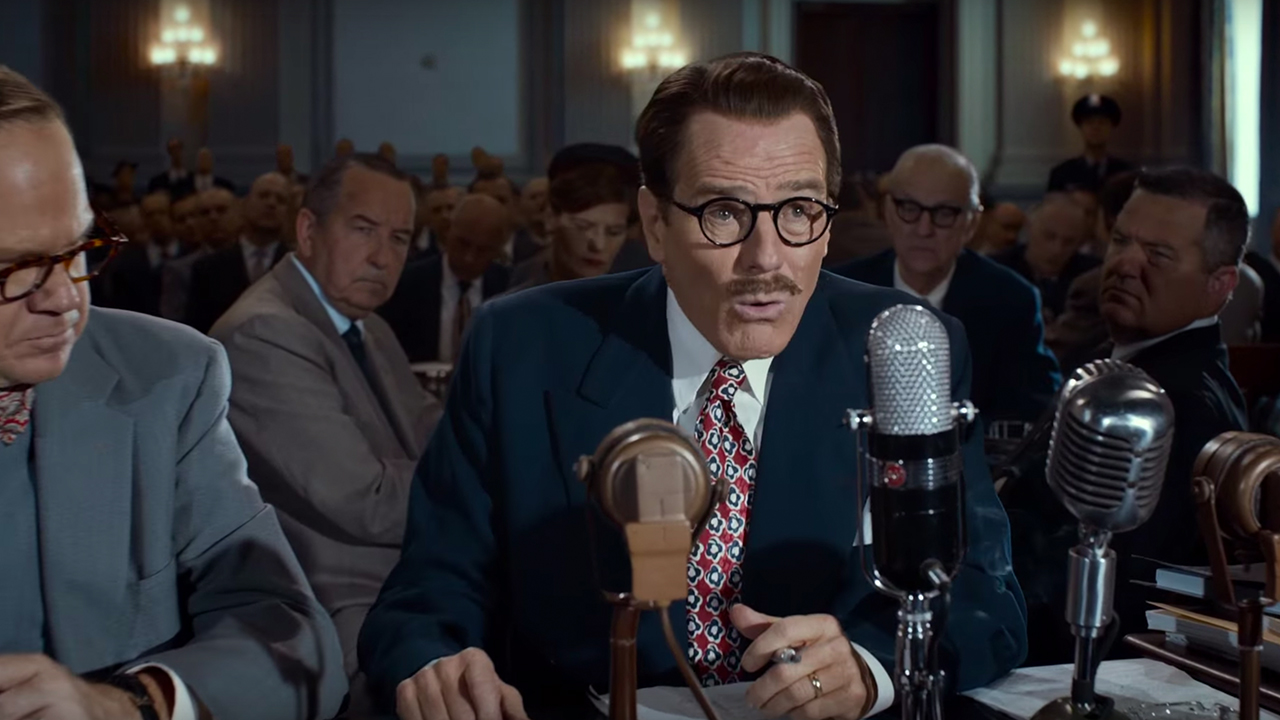
Trumbo, the new political drama directed by Jay Roach, is based on the true story of Hollywood screenwriter, Dalton Trumbo. played by the venerable Bryan Cranston. Dalton Trumbo was one of MANY Hollywood artists from the mid 1940’s to 1960, that were blacklisted from employment by the studios because of their possible affiliations to the communist party. He and hundreds of Hollywood artists were subpoenaed by the House Committee of Unamerican Activities in the late ’40’s, in order to be interrogated for their political beliefs and potential associations with the Communist party.

Dalton was part of the infamous “Hollywood Ten”, a group comprised of ten writers who refused to testify, and as a result, were all found guilty for contempt of Congress, and were subsequently jailed, and black listed. The Hollywood Ten were just a fraction of the working artists in Hollywood at the time whose lives and careers were severely affected, and in many cases, completely destroyed. Trumbo takes a look at the effect the black list had on Dalton’s marriage, family, relationships and career, and explores how the screenwriter dealt with these struggles, and how he duped the studios while the blacklist was still in effect.
The heart of this story is not new: a group of people are unfairly demonized, ostracized and punished, simply for what they believe and for the political associations that they may have had. It’s the story of a mid-twentieth century American government, over run by political machine that abused its’ power in service to its’ own narrow political and cultural ideology, all the while stripping innocent citizens of their basic constitutional rights. Its this heart of the story that should keep the audience engaged throughout the full two hours, and its also the most powerful aspect of the movie.

The performances from the cast are all admirable, but the characters as written, left me feeling that there was quite a bit missing from the truthfulness and real life gravity of their situation. It seemed to glean over what these people really had to go through, and its this oversight that holds Trumbo back from being the movie it deserves to be. Nonetheless, the ensemble cast including Louis CK, Helen Mirren, Diane Lane, John Goodman, Stephen Root, Michael Stuhlbarg and Alan Tudyk all provided performances that helped raise the bar for this slightly above average screenplay. It was great to see Louis CK pull off a dramatic role with ease, all the while still providing “the funny” at the right moments. Cranston’s Trumbo is engaging and empathetic, yet at times, tended to lean more towards a caricature of the man, but just as it touches on being caricature, Cranston effectively pulls back the reins and roots his performance in a truthfulness that simply works well for the director’s tone of the movie. Cranston was a great choice for what Jay Roach intended to do with this screenplay. Helen Mirren gave an extremely strong performance as Hedda Hopper, the most powerful Hollywood gossip columnist of the era, who was on the witchhunt against anybody even remotely affiliated with the Communist party. John Goodman and Stephen Root play B-Movie studio executives that hired Dalton while the blacklist was in effect, and every scene with these two were brilliantly played and by far the most entertaining for me.
When a movie comes out that is based on a true story, those familiar with the true story are going to be the most critical in their review or analyses, and those who are unaware or not too familiar, are usually very forgiving. If you are the latter, you’ll almost definitely enjoy Trumbo. If you are the former (familiar with the Hollywood black list witch hunts of that era), you will most likely be let down by Trumbo, as it does nothing more than skim just below the surface of the times and the main character that the movie is about. What Trumbo misses out on is the wonderful opportunity to effectively satirize the arrogant political abuse and the public paranoia that defined the McCarthyism era. Trumbo had the potential to be a tour de force of a film, from which, much could have been examined, explored, learned about and commented on, yet, it fails to do so in this vein. Fortunately for the movies’ producers, most audience members today are more interested in feeling good about a movie, rather than whether or not a film hits the mark, and for these movie goers, Trumbo should not disappoint at all.

